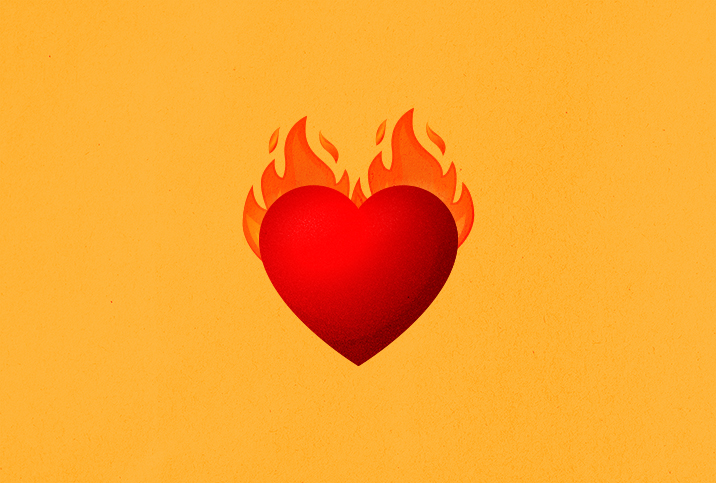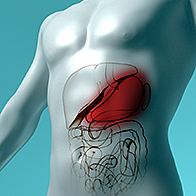Just When You're Finally in the Mood—Heartburn Happens

Most of us know of the painful burning sensation heartburn brings. Formerly referred to as acid indigestion, heartburn affects more than 60 million Americans each month and more than 15 million of us suffer from heartburn every day.
But what exactly is heartburn, is it ever serious, and what should you do about it? We've got the answers to all of your burning questions.
Is heartburn the same as acid reflux?
Heartburn refers to the discomfort you feel in your chest or upper stomach shortly after a meal. This might be present after eating certain foods or when you sit down, lie down or bend over. This condition is caused by acid reflux, which occurs when the stomach acid used to digest your food backs up into your esophagus.
When you eat, there's an opening that food travels through to get to your stomach. This opening normally stays closed after meals, but when it doesn't, you may experience heartburn. The burning sensation is caused by acid backup through this opening. Some sufferers may even experience an acidic taste in their mouth during an episode.
'Heartburn refers to the actual pain you experience'
"Gastroesophageal reflux occurs when stomach contents back up into the esophagus or mouth from the stomach," said Harvey Hamilton Allen Jr., M.D., medical director at Mohawk Valley Endoscopy Center. "When this happens or continues to occur, we feel a burning sensation or regurgitation of food and liquid."
Both heartburn and acid reflux are commonly used interchangeably, but acid reflux refers to the process of the acid traveling back into your esophagus, while heartburn refers to the actual pain you experience.
More severe bouts of heartburn are called gastroesophageal reflux disease (GERD), known as acid reflux disease. This is a more serious condition where sufferers may experience acid reflux daily, multiple times a day or even many times a week.
What causes heartburn?
There can be many causes for heartburn, but certain kinds of food and drink are primary factors. There are three categories of food and beverages, which are mostly the culprits causing heartburn: acidic, spicy and high-fat.
Acidic foods include tomatoes, citrus fruit, onions, peppermint and some wines. Spicy foods are those that include hot peppers, sriracha and so on, but even just black pepper can trigger acid reflux in those who are particularly sensitive. Likewise, high-fat content foods like cheese may trigger an episode. If you combine these foods, symptoms will be heightened.
Other causes of heartburn include pregnancy, smoking, obesity, aspirin or ibuprofen, and some blood pressure medications and sedatives.
Stress and anxiety may also play a large role in GERD, acid reflux and heartburn prevalence and severity. A 2015 study found a link between those with elevated stress levels and heartburn occurrences. Anxiety was also found to play a role in heartburn and GERD episodes.
"Acid reflux can also occur if a person is under a lot of stress, as this increases the production of hydrochloric acid (HCL) in the stomach," said Lisa Andrews, M.Ed., R.D., L.D., and owner of Sound Bites Nutrition.
How to treat heartburn
If your heartburn isn't chronic—that is, it's not happening multiple times a day or week—and it isn't impacting your overall quality of life, there are many ways to treat episodes when they arise. For example:
- Avoid lying down for two hours after eating, especially if you have eaten any "trigger" foods.
- Take over-the-counter antacids, like Tums.
- Keep your upper body elevated—standing if you can.
- Drink one teaspoon of baking soda dissolved in a glass of water.
- Sip apple cider vinegar diluted in water—use a straw to avoid hurting your teeth.
- Chew gum.
- Drink ginger tea.
"The first course of treatment for this condition is lifestyle modifications," Allen Jr. said. "These include elevation of the head during sleep, avoiding smoking, decreasing alcohol, decreasing meals size and fatty foods, and caffeinated or carbonated drinks, and chocolate."
In more severe cases, H2 blockers may be prescribed by a doctor. These medications used to require prescriptions but can now be purchased over the counter. H2 blockers—like Prilosec, Zantac, Prevacid and Pepcid—will help reduce the acid in your stomach, alleviating acid reflux symptoms, like heartburn.
When to see a doctor
Frequent heartburn shouldn't be ignored because it can impact your quality of life and prove serious. But how do you know when it's time to see a doctor?
"When acid reflux becomes chronic, it's known as GERD," Andrews said. "If a person experiences chronic acid reflux accompanied by sore throat, heartburn or cough, they may be doing damage to their esophagus. It's time to see a doctor when acid reflux becomes chronic."
So, if your symptoms aren't getting better, are happening more often or especially if they're impacting your daily life, it's time to talk to a medical professional.
"When the symptoms persist, it is critical to seek medical care from your healthcare provider," Allen Jr. said. "One often confusing symptom is chest pains, but it is still an indication to see your physician, even when caused by acid reflux. Other symptoms are nausea, vomiting, weight loss, difficulty swallowing and stomach pains. Long-term complications of untreated acid reflux are esophageal stricture, dental problems, asthma and throat difficulties, such as hoarseness. The most severe consequence of acid reflux is esophageal cancer."
"Prolonged acid exposure to the esophagus may lead to a condition called Barrett's esophagus, which damages the esophagus," Andrews explained. "This condition increases the risk of esophageal cancer."




















